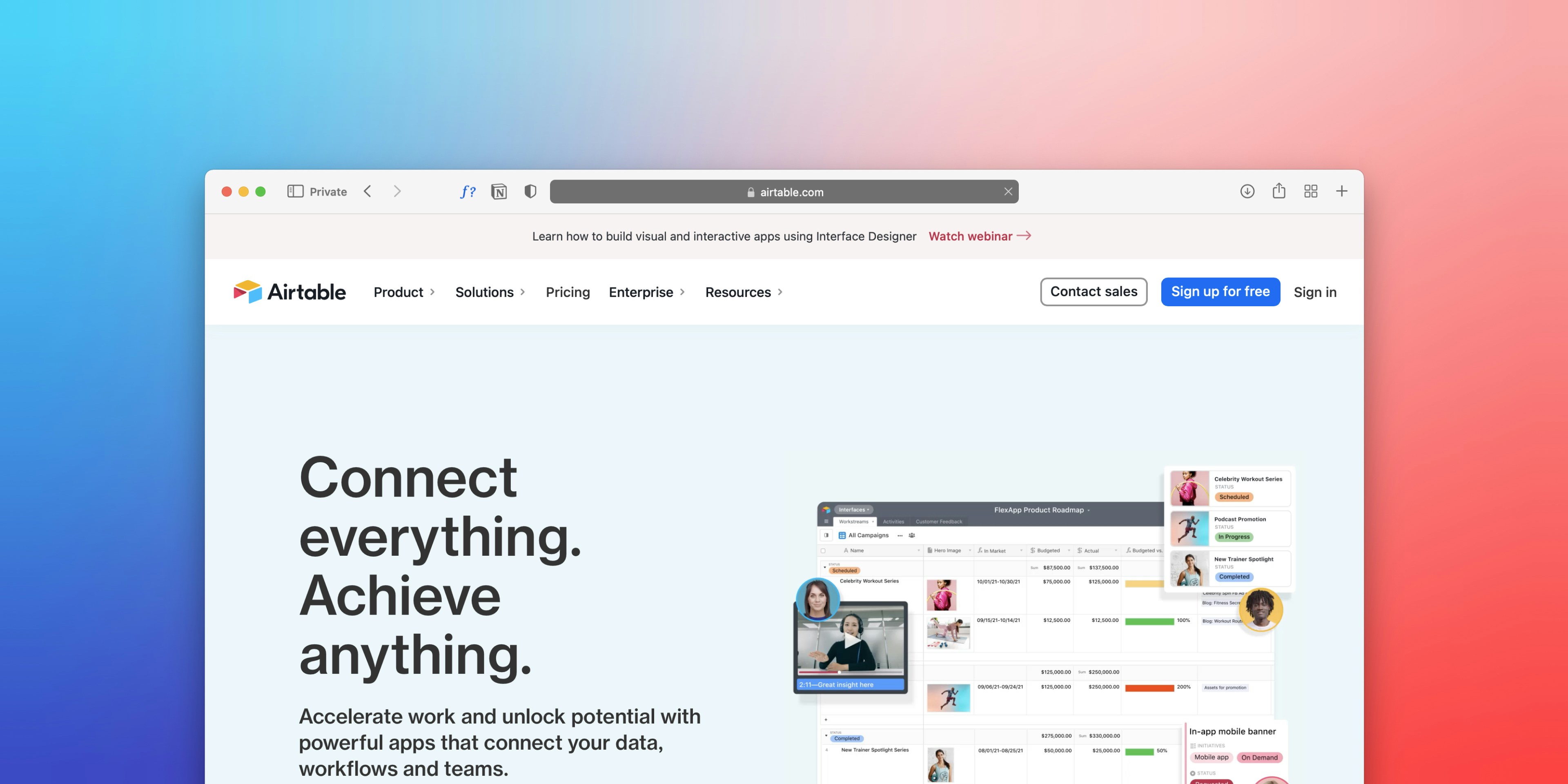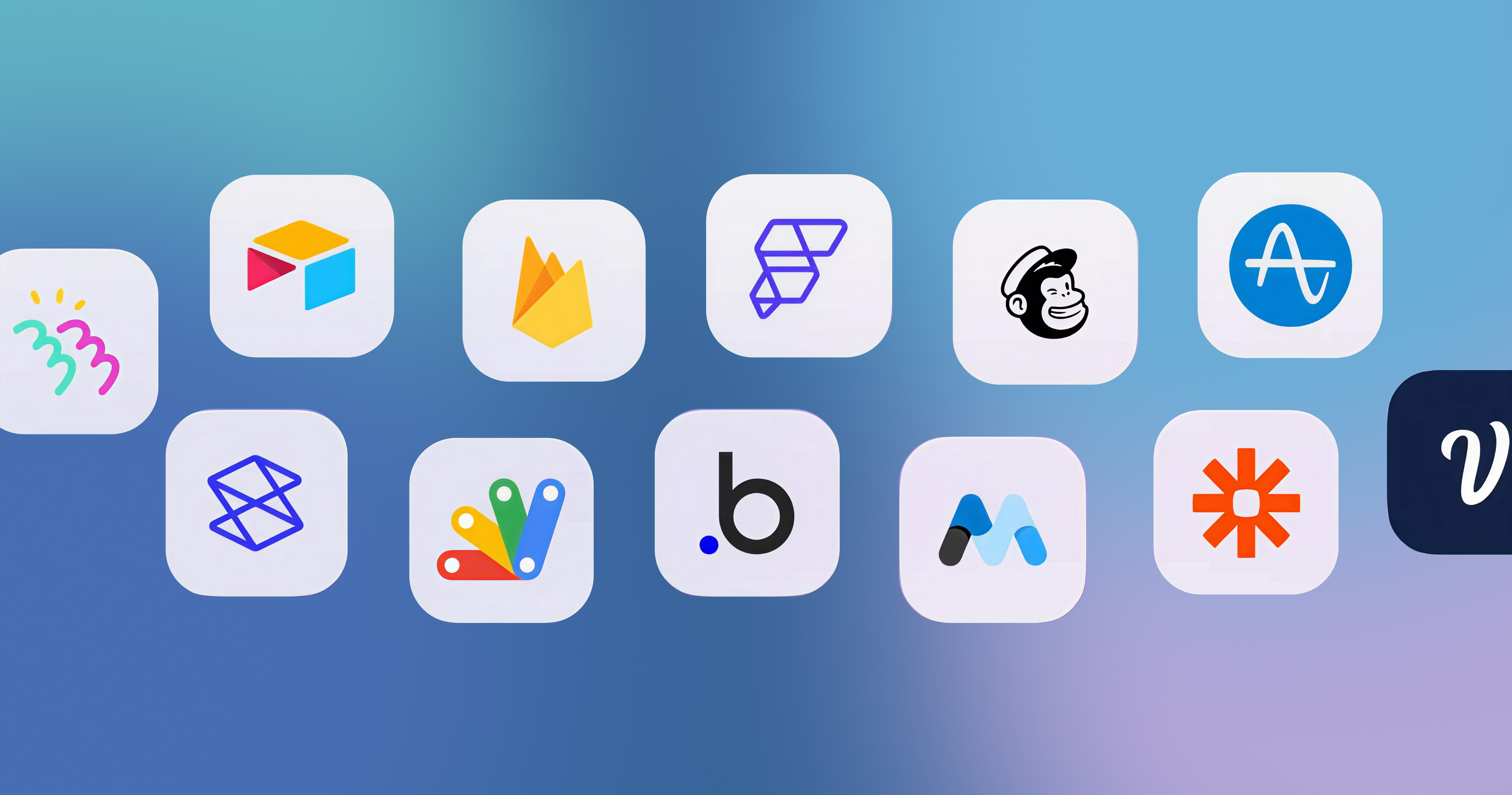-p-2000.png)


7 Reasons Why Airtable is Better than Excel

Do you struggle with organizing data in Excel? Or find it frustrating to work with their limitations and complexities?
If so, it might be worth considering a switch to Airtable - a tool that can help you efficiently organize data in a simpler and user-friendly manner. This trending innovative platform is revolutionizing the way businesses work with data.
This blog will discuss why Airtable is the superior choice by highlighting 7 key advantages over Excel. We'll also show how Airtable's intuitive features can optimize your workflows, boost productivity, and facilitate seamless collaboration with your team.
Whether you're looking for a user-friendly interface or advanced data management capabilities, Airtable has got you covered.
Difference Between Airtable and Excel
When it comes to managing data, Excel is the tried and tested choice for most businesses. However, Airtable is quickly gaining recognition as a more efficient alternative.
One of the significant differences between the two is that Excel is primarily a spreadsheet software, while Airtable is a relational database.
Essentially, this means that Excel is designed for managing tabular data with calculations and formulas. On the other hand, Airtable is more geared toward managing complex data structures and relationships between different pieces of information.
Additionally, Airtable boasts advanced data management capabilities that make organizing and managing data more accessible. Airtable can also help streamline collaboration, especially for remote teams, thanks to its shared views feature.
Ultimately, which platform you choose depends on your specific needs and preferences, but it's worth considering Airtable as a game-changing tool for streamlining your data management processes.
Why is Airtable Better Than Excel?
There are several reasons why Airtable is considered better than excel. They start from an interface that is much simpler to understand than Excel, along with an option to seamlessly collaborate with several people.
Let's look at a few reasons why Airtable is a better choice than Excel:
User-Friendly Interface
Airtable is a fantastic choice for users looking for an intuitive and versatile spreadsheet application. Unlike MS Office Excel, Airtable is a relational database that's easy to use and designed to help users build apps.

Its sleek interface allows you to store thousands of records in virtual storage cells, which automatically update any changes you make in the system's backend. Plus, Airtable offers multiple ways to view information, including spreadsheets and calendars, providing greater flexibility for users.
While on the other hand, MS Office Excel relies solely on the grid view to organize data, limiting its functionality.
Viewing Options
When it comes to viewing options, Airtable clearly takes the cake. Excel's spreadsheet format limits the number of viewing options available to users. Although you can hide some UI features to free up space for your data, you're stuck with the grid view.
On the other hand, since Airtable is a database, it offers a wide range of options to display information in various formats.
You've already seen examples of data being shown in a grid and calendar format, and one of the most useful views for managing workflows is the Kanban view. With this view, you can turn a simple task tracker into a personalized version of Trello.

Airtable offers several other ways to view data, including a timeline, Gantt chart, gallery, or form for simplified data entry.
Recently, the platform added the ability to design your interface using a drag-and-drop builder. This advanced capability surpasses the conventional functionalities of Excel.
Seamless Collaboration
Airtable is a tool that is tailor-made for creating, tracking, and managing workflows, which makes collaborating with others a breeze.

Although Excel and Airtable offer basic collaboration features such as working on documents together, leaving comments and chatting with collaborators on their web versions, Excel lacks the ability to drag and drop tasks from in progress to done or automate Slack messages when the status is updated.
These seemingly small but incredibly important details give Airtable an edge when it comes to collaborative work.
Reach out to our experts!
Schedule a CallPre-Built Templates
Airtable's pre-built templates are a game changer when it comes to creating efficient workflows. Unlike Excel, Airtable offers a wide range of templates that are specifically designed for different industries and use cases, including project management, event planning, customer relationship management, and more.
These templates are fully customizable, so users can adapt them to fit their unique workflows seamlessly.

With Airtable's templates, users can easily kickstart their projects and focus on their core tasks without worrying about starting from scratch. Ultimately, Airtable's templates are a significant advantage for users looking to streamline their workflows.
Third-Party Integrations
Both Airtable and Excel have the ability to integrate with other apps and services, with Airtable offering a few built-in integrations and Excel providing add-ins for integrating workbooks with various online services and databases.
Third-party integration tools can also be used to integrate both platforms with other apps, including each other.
Airtable allows for data export to Google Sheets or BigQuery, while Excel is commonly used as a data destination, automating exports from sources such as Jira, Trello, and Shopify, among others, without coding.

Nonetheless, due to its versatility in creating workflows, Airtable is better suited for collaborating on email sequences. Its automations also offer more practicality, as they can be set up without any coding using different triggers and cross-platform automated actions such as sending Slack messages or Gmail emails.
File Shareability
When you're working as a team, sharing files is essential. And although both Airtable and Excel let you attach documents, there are certain differences you should know.
With Airtable, you can attach documents to existing fields, which creates a dedicated space for your attachments that makes it easy for others to find what they're looking for. Airtable also supports all types of documents, even generating a thumbnail for certain file types like Word and Excel. You can also preview documents in full screen and set permissions for specific users.
Excel, on the other hand, allows you to attach documents to columns and cells, so they become an integral part of the spreadsheet. But when it comes to shareability, Airtable comes out on top since you can easily drag and drop files from one field to another.
Overall, Airtable's file-sharing capabilities are more versatile and user-friendly.
Mobile App Functionality
When it comes to using Airtable and Excel on mobile devices, both apps are functional, but viewing spreadsheets on a smartphone can often be a challenge. While Excel's app allows you to perform almost any task you can on a desktop, spreadsheets aren't optimized for a small screen.
Airtable's mobile app, though less functional than Excel, is easier to work with. It's built for creating small apps that connect to databases, so managing tasks like editorial calendars or to-do lists is straightforward.

You can do everything on the app that you would on a desktop without the inconvenience of dealing with a cramped screen.
Overall, the Airtable mobile app is more intuitive to use on a mobile device.
Advantages of Airtable over Excel
Both Airtable and Excel are valuable spreadsheet software tools with their own unique strengths and capabilities. While Airtable is a hybrid of a database and spreadsheet, it still fits into the category of spreadsheet software.
However, there are many reasons why Airtable is better than Excel when it comes to data management. From its ease of use and intuitive interface to its powerful collaboration features and customizable templates, Airtable offers a level of flexibility that Excel simply can't match.
Whether you're managing a small project or an extensive database, Airtable's unique blend of spreadsheet functionality and database capabilities makes it the superior choice. While Excel is a reliable and widely used tool, it's clear that Airtable's innovative features and user-friendly interface are why Airtable is better than Excel for modern data management needs.
If you ever need help setting up Airtable for your business, our team of Airtable consultants is always available to assist you. Contact us for a free consultation call and discover how we can help you scale your business with Airtable.

Reach out to our experts!
Schedule a CallReach out to our experts!
Schedule a CallFAQ
Can Airtable do calculations?
Yes, Airtable can be used to perform calculations by using formulas. Users can create formulas to carry out different types of calculations on their data.
Why is Airtable better than sheets?
Airtable is better than Sheets because it offers a more user-friendly interface, greater flexibility, and more advanced features for data management.
Can Airtable create reports?
Yes, Airtable can create reports by using its built-in reporting tools. These tools allow users to generate summary reports, pivot tables, and charts that can be customized to meet their specific needs.
What type of database does Airtable use?
Airtable uses a hybrid database system that combines the flexibility of a spreadsheet with the power of a relational database. This allows users to organize and link various types of data in a customizable and easy-to-use interface.
What kind of data can you store in an Airtable spreadsheet?
Airtable is a flexible database platform that can store various types of data, such as text, numbers, dates, attachments, links, checkboxes, and even complex data types like barcodes and formula fields. It can also support multiple views and allow for collaboration and automation.
Editorial Team
Publisher
Do you struggle with organizing data in Excel? Or find it frustrating to work with their limitations and complexities?
If so, it might be worth considering a switch to Airtable - a tool that can help you efficiently organize data in a simpler and user-friendly manner. This trending innovative platform is revolutionizing the way businesses work with data.
This blog will discuss why Airtable is the superior choice by highlighting 7 key advantages over Excel. We'll also show how Airtable's intuitive features can optimize your workflows, boost productivity, and facilitate seamless collaboration with your team.
Whether you're looking for a user-friendly interface or advanced data management capabilities, Airtable has got you covered.
Difference Between Airtable and Excel
When it comes to managing data, Excel is the tried and tested choice for most businesses. However, Airtable is quickly gaining recognition as a more efficient alternative.
One of the significant differences between the two is that Excel is primarily a spreadsheet software, while Airtable is a relational database.
Essentially, this means that Excel is designed for managing tabular data with calculations and formulas. On the other hand, Airtable is more geared toward managing complex data structures and relationships between different pieces of information.
Additionally, Airtable boasts advanced data management capabilities that make organizing and managing data more accessible. Airtable can also help streamline collaboration, especially for remote teams, thanks to its shared views feature.
Ultimately, which platform you choose depends on your specific needs and preferences, but it's worth considering Airtable as a game-changing tool for streamlining your data management processes.
Why is Airtable Better Than Excel?
There are several reasons why Airtable is considered better than excel. They start from an interface that is much simpler to understand than Excel, along with an option to seamlessly collaborate with several people.
Let's look at a few reasons why Airtable is a better choice than Excel:
User-Friendly Interface
Airtable is a fantastic choice for users looking for an intuitive and versatile spreadsheet application. Unlike MS Office Excel, Airtable is a relational database that's easy to use and designed to help users build apps.

Its sleek interface allows you to store thousands of records in virtual storage cells, which automatically update any changes you make in the system's backend. Plus, Airtable offers multiple ways to view information, including spreadsheets and calendars, providing greater flexibility for users.
While on the other hand, MS Office Excel relies solely on the grid view to organize data, limiting its functionality.
Viewing Options
When it comes to viewing options, Airtable clearly takes the cake. Excel's spreadsheet format limits the number of viewing options available to users. Although you can hide some UI features to free up space for your data, you're stuck with the grid view.
On the other hand, since Airtable is a database, it offers a wide range of options to display information in various formats.
You've already seen examples of data being shown in a grid and calendar format, and one of the most useful views for managing workflows is the Kanban view. With this view, you can turn a simple task tracker into a personalized version of Trello.

Airtable offers several other ways to view data, including a timeline, Gantt chart, gallery, or form for simplified data entry.
Recently, the platform added the ability to design your interface using a drag-and-drop builder. This advanced capability surpasses the conventional functionalities of Excel.
Seamless Collaboration
Airtable is a tool that is tailor-made for creating, tracking, and managing workflows, which makes collaborating with others a breeze.

Although Excel and Airtable offer basic collaboration features such as working on documents together, leaving comments and chatting with collaborators on their web versions, Excel lacks the ability to drag and drop tasks from in progress to done or automate Slack messages when the status is updated.
These seemingly small but incredibly important details give Airtable an edge when it comes to collaborative work.
Reach out to our experts!
Schedule a CallPre-Built Templates
Airtable's pre-built templates are a game changer when it comes to creating efficient workflows. Unlike Excel, Airtable offers a wide range of templates that are specifically designed for different industries and use cases, including project management, event planning, customer relationship management, and more.
These templates are fully customizable, so users can adapt them to fit their unique workflows seamlessly.

With Airtable's templates, users can easily kickstart their projects and focus on their core tasks without worrying about starting from scratch. Ultimately, Airtable's templates are a significant advantage for users looking to streamline their workflows.
Third-Party Integrations
Both Airtable and Excel have the ability to integrate with other apps and services, with Airtable offering a few built-in integrations and Excel providing add-ins for integrating workbooks with various online services and databases.
Third-party integration tools can also be used to integrate both platforms with other apps, including each other.
Airtable allows for data export to Google Sheets or BigQuery, while Excel is commonly used as a data destination, automating exports from sources such as Jira, Trello, and Shopify, among others, without coding.

Nonetheless, due to its versatility in creating workflows, Airtable is better suited for collaborating on email sequences. Its automations also offer more practicality, as they can be set up without any coding using different triggers and cross-platform automated actions such as sending Slack messages or Gmail emails.
File Shareability
When you're working as a team, sharing files is essential. And although both Airtable and Excel let you attach documents, there are certain differences you should know.
With Airtable, you can attach documents to existing fields, which creates a dedicated space for your attachments that makes it easy for others to find what they're looking for. Airtable also supports all types of documents, even generating a thumbnail for certain file types like Word and Excel. You can also preview documents in full screen and set permissions for specific users.
Excel, on the other hand, allows you to attach documents to columns and cells, so they become an integral part of the spreadsheet. But when it comes to shareability, Airtable comes out on top since you can easily drag and drop files from one field to another.
Overall, Airtable's file-sharing capabilities are more versatile and user-friendly.
Mobile App Functionality
When it comes to using Airtable and Excel on mobile devices, both apps are functional, but viewing spreadsheets on a smartphone can often be a challenge. While Excel's app allows you to perform almost any task you can on a desktop, spreadsheets aren't optimized for a small screen.
Airtable's mobile app, though less functional than Excel, is easier to work with. It's built for creating small apps that connect to databases, so managing tasks like editorial calendars or to-do lists is straightforward.

You can do everything on the app that you would on a desktop without the inconvenience of dealing with a cramped screen.
Overall, the Airtable mobile app is more intuitive to use on a mobile device.
Advantages of Airtable over Excel
Both Airtable and Excel are valuable spreadsheet software tools with their own unique strengths and capabilities. While Airtable is a hybrid of a database and spreadsheet, it still fits into the category of spreadsheet software.
However, there are many reasons why Airtable is better than Excel when it comes to data management. From its ease of use and intuitive interface to its powerful collaboration features and customizable templates, Airtable offers a level of flexibility that Excel simply can't match.
Whether you're managing a small project or an extensive database, Airtable's unique blend of spreadsheet functionality and database capabilities makes it the superior choice. While Excel is a reliable and widely used tool, it's clear that Airtable's innovative features and user-friendly interface are why Airtable is better than Excel for modern data management needs.
If you ever need help setting up Airtable for your business, our team of Airtable consultants is always available to assist you. Contact us for a free consultation call and discover how we can help you scale your business with Airtable.
Reach out to our experts!
Button TextFAQ
Can Airtable do calculations?
Yes, Airtable can be used to perform calculations by using formulas. Users can create formulas to carry out different types of calculations on their data.
Why is Airtable better than sheets?
Airtable is better than Sheets because it offers a more user-friendly interface, greater flexibility, and more advanced features for data management.
Can Airtable create reports?
Yes, Airtable can create reports by using its built-in reporting tools. These tools allow users to generate summary reports, pivot tables, and charts that can be customized to meet their specific needs.
What type of database does Airtable use?
Airtable uses a hybrid database system that combines the flexibility of a spreadsheet with the power of a relational database. This allows users to organize and link various types of data in a customizable and easy-to-use interface.
What kind of data can you store in an Airtable spreadsheet?
Airtable is a flexible database platform that can store various types of data, such as text, numbers, dates, attachments, links, checkboxes, and even complex data types like barcodes and formula fields. It can also support multiple views and allow for collaboration and automation.
Editorial Team
Publisher




Hi, I'm Mike!
If you are enjoying the article, feel free to subscribe to our monthly newsletter.
If you have any project requirements, please contact us.







.png)









